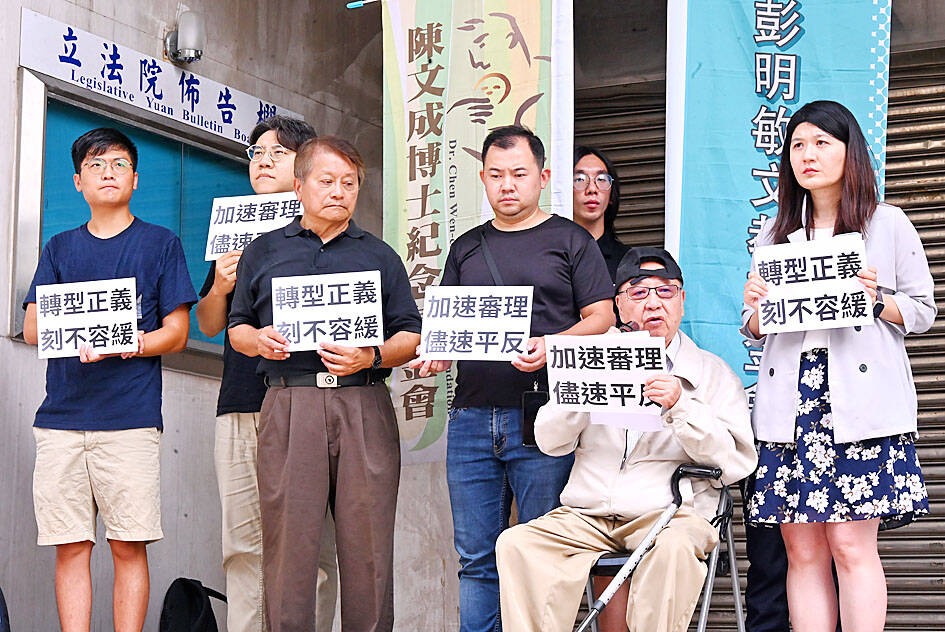The Ministry of Justice must address the case against democracy advocate Peng Ming-min (彭明敏), while the Executive Yuan must accelerate broader judicial reforms, including transitional justice education, groups told a news conference in Taipei yesterday, the 60th anniversary of the day Peng released A Declaration of Formosan Self-Salvation (台灣人民自救宣言).
Peng passed away on April, 8, 2022.
Peng in 1964 drafted the declaration with his students Hsieh Tsung-min (謝聰敏) and Wei Ting-chao (魏廷朝). The document called Chiang Kai-shek’s (蔣介石) dream of “retaking the mainland” unattainable, and advocated for “one Taiwan, one China,” a new constitution, joining the UN as Taiwan and creating a free nation.

Photo: Liu Hsin-de, Taipei Times
Representatives of civic groups — including the Peng Ming-min Foundation, the Educational Foundation of Chung-Ming Hsieh, the Wei Ting-chao Human Rights, Culture and Education Association, and the National Taiwan University (NTU) Graduate Student Association School History Investigation Task Force — made three demands:
They called on the Ministry of Justice to reassess the case against Peng; the Executive Yuan to speed up the process of broader judicial and administrative redress; and for transitional justice education to be implemented and for the effects of the White Terror on campuses to be investigated.
During the White Terror era, Peng, Hsieh and Wei wrote the declaration, and advocated Taiwanese democracy and freedom, but faced a miscarriage of justice that has yet to be resolved, Peng Ming-min Foundation chairman Cheng Yi-ho (鄭義和) said.
The case still reverberates within academic circles and although Peng passed away more than two years ago, the ideals he stood for remain, Cheng said.
He called for an urgent redress and for government agencies to focus on transitional justice, not only in Peng’s case, but also the 20,000 students, teachers and others affected during the White Terror period.
“Time is the biggest enemy,” he said.
Educational Foundation of Chung-Ming Hsieh chairman Hsueh Han-chun (薛翰駿) said that the transitional justice commission — which was ended two years ago — should be reinstated and its responsibilities distributed among government agencies.
Although the Executive Yuan has passed the National Action Program for Transitional Justice Education (國家轉型正義教育綱領), the effects so far have been limited, said Hsu Kuan-tse (許冠澤), a member of the graduate student investigative team.
Whenever the state exonerates a student, revokes a guilty verdict or redresses a violation, the person’s school should be automatically notified, Hsu said.
The school can hold commemorative activities and use the event as an opportunity to educate students and professors, promote the broader goal of transitional justice education and shed light on the experiences of alumni, he said.
The foundation said that while Peng’s family has not yet submitted a petition to the Ministry of Justice to redress his case, the foundation in November last year submitted a petition, but has not yet received a response.
The foundation announced two activities to be held this week.
On Thursday a seminar is to commemorate Peng’s declaration and President William Lai (賴清德) has been invited speak at it, the foundation said.
The second event is a music festival to be held at the NTU School of Law, it said.
People who attend are invited to participate and deepen their understanding of transformational justice, it added.

Chinese Nationalist Party (KMT) Chairman Eric Chu (朱立倫), spokeswoman Yang Chih-yu (楊智伃) and Legislator Hsieh Lung-chieh (謝龍介) would be summoned by police for questioning for leading an illegal assembly on Thursday evening last week, Minister of the Interior Liu Shyh-fang (劉世芳) said today. The three KMT officials led an assembly outside the Taipei City Prosecutors’ Office, a restricted area where public assembly is not allowed, protesting the questioning of several KMT staff and searches of KMT headquarters and offices in a recall petition forgery case. Chu, Yang and Hsieh are all suspected of contravening the Assembly and Parade Act (集會遊行法) by holding

PRAISE: Japanese visitor Takashi Kubota said the Taiwanese temple architecture images showcased in the AI Art Gallery were the most impressive displays he saw Taiwan does not have an official pavilion at the World Expo in Osaka, Japan, because of its diplomatic predicament, but the government-backed Tech World pavilion is drawing interest with its unique recreations of works by Taiwanese artists. The pavilion features an artificial intelligence (AI)-based art gallery showcasing works of famous Taiwanese artists from the Japanese colonial period using innovative technologies. Among its main simulated displays are Eastern gouache paintings by Chen Chin (陳進), Lin Yu-shan (林玉山) and Kuo Hsueh-hu (郭雪湖), who were the three young Taiwanese painters selected for the East Asian Painting exhibition in 1927. Gouache is a water-based

Taiwan would welcome the return of Honduras as a diplomatic ally if its next president decides to make such a move, Minister of Foreign Affairs Lin Chia-lung (林佳龍) said yesterday. “Of course, we would welcome Honduras if they want to restore diplomatic ties with Taiwan after their elections,” Lin said at a meeting of the legislature’s Foreign Affairs and National Defense Committee, when asked to comment on statements made by two of the three Honduran presidential candidates during the presidential campaign in the Central American country. Taiwan is paying close attention to the region as a whole in the wake of a

OFF-TARGET: More than 30,000 participants were expected to take part in the Games next month, but only 6,550 foreign and 19,400 Taiwanese athletes have registered Taipei city councilors yesterday blasted the organizers of next month’s World Masters Games over sudden timetable and venue changes, which they said have caused thousands of participants to back out of the international sporting event, among other organizational issues. They also cited visa delays and political interference by China as reasons many foreign athletes are requesting refunds for the event, to be held from May 17 to 30. Jointly organized by the Taipei and New Taipei City governments, the games have been rocked by numerous controversies since preparations began in 2020. Taipei City Councilor Lin Yen-feng (林延鳳) said yesterday that new measures by